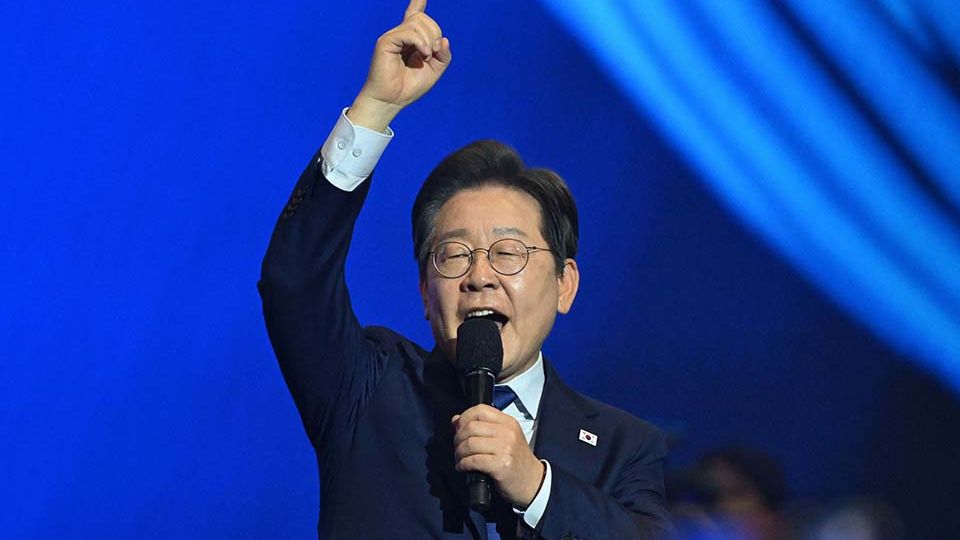May 8, 2025
SEOUL – The Seoul High Court said Wednesday that it has postponed the first in a series of criminal hearings involving Rep. Lee Jae-myung, to June 18, 15 days after the presidential election, to avoid “controversy over the fairness of the trial.”
According to the court, the decision is meant to give Lee — a presidential candidate and the defendant in the case — “equal campaign opportunities” during the campaign period for the June 3 presidential election.
The Seoul High Court has been tasked with handing down a sentence for election law violations regarding two statements Lee made in 2021 during campaigning ahead of the 2022 election, which the Supreme Court judged to be “false information.” Lee lost the 2022 election by a razor-thin margin to Yoon Suk Yeol.
The court’s announcement followed the Democratic Party’s request that the court delay Lee’s hearing, originally scheduled for May 15, until after the election.
Lee said during a visit to Jeonju, North Jeolla Province, that it was “a reasonable decision in accordance with the spirit of the Constitution.” Had the appellate court handed down a fine of 1 million won ($720) or more in his case, Lee would have been disqualified for the presidency for 10 years from the date the ruling was finalized.
On the same day, the Seoul Central District Court also rescheduled a hearing in another criminal case in which Lee is accused of breach of trust concerning a land corruption scandal in Seongnam, Gyeonggi Province. Originally scheduled for May 27, the hearing was postponed to June 24.
The Democratic Party, meanwhile, moved to ensure Lee’s immunity from any criminal penalties if he wins the election.
The National Assembly’s Legislation and Judiciary Committee on Wednesday passed a revision to the Criminal Procedure Act to suspend any ongoing criminal court proceedings against a person who is elected president until the end of their term, unless the court intends to acquit the person of charges.
The committee members from the People Power Party boycotted the move but those from the Democratic Party unilaterally sent it to the plenary session.
Lee faces five ongoing criminal court proceedings. Alongside his election law violation, Lee also faces charges of involvement in perjury, breach of trust regarding development sites in the Baekyeon-dong and Daejang-dong areas of Seongnam, unauthorized money transfer to North Korea and embezzlement of public funds.
Article 84 of the Constitution stipulates that the South Korean president is immune to prosecution during their term for any criminal charges except for insurrection or treason. But the clause does not clarify whether a president could be immediately cleared of any criminal charges that he or she was already facing before being elected.
To “realize the true intent of the Constitution,” the bill, proposed by 25 Democratic Party lawmakers on Friday, is meant to suspend ongoing criminal trials against anyone elected president for the duration of their term, citing a lack of clarity in the current provisions.
Rep. Shin Dong-uk of the conservative People Power Party criticized the Democratic Party for reducing itself to a “lobbying institution” to make Lee Jae-myung president, in a statement Wednesday.
The Justice Ministry on Wednesday also expressed its concern that the presidency “could turn into a haven for a criminal.”
Meanwhile, Democratic Party lawmakers at the committee also unilaterally agreed to convene a parliamentary hearing over Supreme Court Chief Justice Jo Hee-de’s alleged interference in the presidential election on May 14. The party was also planning to accuse all 10 justices at the Supreme Court of abusing their power with the 10-2 ruling to find Lee guilty, but it canceled the event.
The Democratic Party was also moving to revise the Public Official Election Act, which would, in effect, invalidate the prosecution’s indictment against Lee for spreading false information and nullify any court verdicts based on the indictment. The National Assembly’s Public Administration and Security Committee greenlighted the revision at its meeting on Wednesday.
Article 250 of the Public Official Election Act stipulates that anyone who spreads false information about a candidate’s “behavior” — including candidates themselves — in a way that benefits a candidate may face up to five years in prison or a fine of up to 30 million won.
The clause was the basis for the Supreme Court’s ruling that found Lee guilty of a crime.
Reading the verdict on May 1, Chief Justice Jo said that the clause is designed to uphold voters’ right to know, which is enshrined under the Constitution, adding the scope of the presidential candidate’s freedom of political expression “cannot be equivalent to those of ordinary citizens.”
According to the revision bill, the current rule has undermined the predictability of how the act is to be applied because of the vagueness of the term “behavior” in Article 250, in determining whether a candidate is lying, so the revised bill would remove the term.


